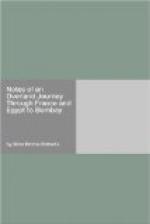Perhaps, considering the difficulty of conciliating the semi-barbarous tribes in the neighbourhood, the trade and population of Aden have increased as much as we could reasonably hope; but when peace shall at length be established, it will doubtless attract merchants and Banians from Surat, as well as all other adjacent places. If at this moment our expectations have not been completely answered, we have at least the satisfaction of knowing that, besides having saved the Red Sea from the encroachments of the Pasha of Egypt, we have anticipated a rival power, which has already derived greater advantage from our supineness, with regard to our Eastern possessions, than is desirable.
The Americans, during 1833-4-5, had a small squadron looking all about for a spot which they could turn to good account. Socotra, from its convenient position between Africa and Arabia, proved a point of attraction, and had not Capt. Haines, of the Indian Navy, promptly taken possession, in the name of Great Britain, they would in all probability have succeeded in effecting a settlement. With their usual attention to the interests of their commerce, the Americans have a resident permanently stationed at Zanzibar, and have made advantageous arrangements with the Imaum of Muscat, whereby the trade with the United States has greatly increased; American ships are constantly arriving, with piece-goods, glass-ware, &c, and returning with profitable cargoes, the produce of Africa.
The inhabitants of Aden appear to be a peaceable race, generally well affected to the government, from which they cannot fail to derive advantage. The Jews, as I have before mentioned, are the most important, both in consequence of their number and of their superior wealth; they belong to the tribe of Judah, and are very industrious, being the manufacturers of the place.
It is by the Jews and their families, the females assisting, that a coarse kind of cloth, employed for their own garments, and also sold to strangers, is spun and woven. This cloth is in much esteem amongst the Arabs: when prepared for them, it is dyed blue, sometimes ornamented with red borders, indigo being employed, together with extracts from other plants. The women generally wear a single loose garment, covering the head with a handkerchief when they leave the house; they do not, however, conceal their faces. Previous to the occupation of Aden, the Jewesses were remarkable for the propriety of their manners, but as they are esteemed handsome, and moreover attract by their good temper and intelligence, it is to be feared that they will meet with many temptations to depart from the decorum they have hitherto maintained. Like their sex and peculiar race, they are fond of ornaments, adorning themselves with large silver ear-rings, bracelets, necklaces, and armlets. Hitherto, whatever wealth they possessed, they were obliged to conceal, the Arabs proving very severe and oppressive masters; their prospects are now brightening, and they have already shown a disposition to profit by the new order of things, having opened shops in the bazaar, and commenced trading in a way they never ventured upon before.




